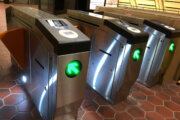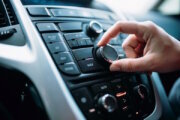Most of the time, you’re probably not paying any attention to your heartbeat. Sure, you know that your heart is constantly pumping blood throughout your body. You may even track your heart rate, along with other vitals, through an Apple Watch or Fitbit. But you’re probably not physically feeling the beat of your heart or giving it much attention.
If you’re having heart palpitations, however, that’s another story.
What Are Heart Palpitations and What Do They Feel Like?
While palpitations can mean different things to different people, it typically refers to some awareness of one’s heartbeat, explains Dr. Jay Sengupta, a cardiac electrophysiologist with the Allina Health Minneapolis Heart Institute at Abbott Northwestern Hospital in Minnesota.
Heart palpitations may feel like:
— Your heart is skipping a beat.
— A fluttering sensation in your chest.
— A pounding or throbbing sensation — like your heart is beating too hard.
— An abnormally fast, or racing, heartbeat.
— A “flip-flopping” sensation, as if your heart is “turning over” in your chest.
By comparison, you may feel your heart thumping harder during or after a hard run, in step with the effort you put into your workout. But with palpitations, it’s the irregularity of the beat — it’s “off” from what you’re used to — that really stands out. (Keep in mind that palpitations can occur after exercise too.)
[READ: What Are the Best Heart-Healthy Exercises?]
What Causes Heart Palpitations After Eating?
Although causes vary, in some cases, mealtimes or certain foods or drinks can trigger palpitations when you’re eating.
“Feeling a skipped beat on occasion is fairly common and usually not dangerous,” confirms Dr. Allison Zielinski, a cardiologist and co-director of the sports cardiology program at Northwestern Medicine Bluhm Cardiovascular Institute in Chicago.
As you’re eating and digesting, responses from two components of your body’s autonomic nervous system can affect your heartbeat, explains Dr. Daniel Alyesh, a cardiac electrophysiologist with South Denver Cardiology Associates in Colorado:
— Fight or flight. This response arises from the sympathetic nervous system, which reacts to a variety of stimulants — including substances like caffeine. These can stimulate the release of adrenaline, leading to palpitations as your heart accelerates, causing abnormal heartbeats or heart rhythms.
— Rest or digestion. This response arises from the parasympathetic nervous system, which ramps up during digestion and can stimulate abnormal heart rhythms, such as atrial fibrillation.
Atrial fibrillation is the most common abnormal heart rhythm in the U.S..
“For the most part, if it’s managed well, it can be relatively benign,” notes Alyesh, who is also vice chair of Heart Rhythm TV, the Heart Rhythm Society’s media outlet. “But it does carry within it a risk of stroke, and it needs to be addressed with a doctor if you carry that diagnosis.”
[READ Navigating the Road to Recovery After a Stroke]
Is It Really a Palpitation?
Several eating-related occurrences can be mistaken for heart palpitations.
“For instance, after eating, you can get heartburn, you can get indigestion — all of those things can be confused with a palpitation,” Alyesh says. “But palpitations are sensations: The heart is flip-flopping in the chest, a sensation that we’re skipping a beat, that the heart is racing.”
By contrast, heartburn is more of a burning sensation behind the breastbone.
[READ: Understanding the Causes of Right-Side Chest Pain]
When to Be Concerned About Palpitations
In some cases, palpitations can be a sign of a serious issue. For example, if palpitations are sustained or increase in frequency, they may be a sign of a more serious medical issue, such as arrhythmia, and deserve medical attention.
“Symptoms that can be a sign of something more concerning include sudden and prolonged heart racing at rest, sustained irregular heart rate or palpitations accompanied by dizziness, chest pain or shortness of breath,” Zielinski says. “Sudden loss of consciousness, also called syncope, can in certain cases be due to an abnormal heart rhythm, so it requires evaluation.”
To get the appropriate diagnosis, the first step is identifying the heart’s electrical rhythm when symptoms occur, says Dr. James Ip, a cardiologist at Weill Cornell Medicine and New York-Presbyterian Hospital in New York City.
“Devices such as an electrocardiographic cardiac monitoring system or a patient-initiated recording device can be useful to correlate the heart’s electrical system with the symptom,” he adds.
Some people should prioritize seeing a health care professional when something seems off with their heart. They include:
— Those who have preexisting heart problems.
— Older adults.
— Those with medical conditions — such as coronary artery disease, thyroid disease and obstructive sleep apnea — that might increase the risk of more dangerous arrhythmias.
— Those who are pregnant.
What Foods Can Cause Heart Palpitations?
While almost any food could be involved with heart palpitation symptoms, the most common culprits are spicy foods, higher-fat and higher-sugar foods, Alyesh finds.
General triggers also include:
— Caffeine in excess.
— Sugar.
— Alcohol.
— Carb-rich foods.
— Tyramine.
Caffeine in excess
Having your morning coffee is probably fine and won’t send your heart fluttering. In fact, some research has undercut the notion that caffeine consumption causes palpitations or contributes to arrhythmias, like ectopy, which are small changes in a heartbeat that is otherwise normal.
“Pretty much if you have one or two cups of coffee, then you really should not be having those palpitations,” says Dr. Evelina Grayver, director of the women’s heart program at Northwell Health in Manhasset, New York.
But while there’s no universal threshold when it comes to how much coffee triggers palpitations, drinking more than a moderate amount could cause palpitations for some consumers.
“Some people are more sensitive to caffeine than others, and it may make them feel jittery or feel like their heart is racing,” Zielinski notes. “In that case, they may want to avoid it.”
Downing other caffeine-containing substances might also send your heart fluttering, not to mention drive up blood pressure.
For example, many energy drinks are loaded with caffeine and other caffeine-like substances, such as taurine, that give you a jolt, especially if you buy it in a supersized can or have more than one.
“Energy drinks, which can contain much higher amounts of caffeine than coffee or soda, as well as other stimulants like guarana, can, in rare cases, cause dangerous arrhythmias,” Zielinski says. “This risk is greater when ingested in large amounts or paired with other stimulants or exercise. People with known arrhythmias should probably avoid them.”
It’s not even the pep caffeine puts in our step, but its diuretic property that’s problematic. Dehydration can cause palpitations, so be sure to drink plenty of water.
Other caffeine sources like tea and chocolate — which tends to have far less caffeine than coffee but can be loaded with added sugar — also contribute to palpitations. And, again, that’s especially true if they’re consumed in large quantities.
Sugar
As mentioned above, sugar can also be a culprit. Consuming lots of sugar can cause the body to release the hormone epinephrine, or adrenaline, which increases heart rate.
While there’s no precise threshold to avoid palpitations, the 2020-2025 Dietary Guidelines for Americans recommends getting no more than 10% of daily calories from added sugar. That equates to 12 teaspoons, 50 grams or 200 calories from added sugar, or roughly the equivalent of a piece of chocolate cake. A can of regular soda has about 126 calories from added sugar.
Alcohol
Although moderate drinking — no more than one drink for women and two for men daily — is generally the upper threshold set for good health, you could possibly still experience heart palpitations below that. And for people who have arrhythmias and experience palpitations, alcohol is one of the most common triggers.
“There is a strong association between alcohol and atrial fibrillation,” Zielinski points out.
Imbibing can also have negative heart effects overall.
“Alcohol, especially at higher levels, is cardiotoxic to a degree,” Alyesh says. “It’s a pretty potent stimulant of palpitations, and palpitations that are caused by abnormal heart rhythms.”
In the health field, the phrase “holiday heart” is sometimes used, but alcohol-related palpitations can happen any day of the year.
“The term ‘holiday heart’ refers to increased palpitations after a binge of alcohol, which is usually used in reference to atrial fibrillation after heavy drinking,” Zielinski says. “For people with atrial fibrillation, alcohol can increase the risk that they may have an episode. In general, drinking higher amounts of alcohol increases the risk of developing atrial fibrillation.”
Carb-rich foods
Processed carbs can contribute to palpitations as well. That’s because most carbs are broken down into glucose, or sugar, when they’re digested. As a result, they can drive up blood sugar levels, just like table sugar. If a person has low blood sugar, the swing or spike in blood sugar level is more significant with a carb-rich meal. Blood sugar changes can cause rapid heartbeat or other heart rate variations.
The easy availability of high-carb foods for breakfast, lunch and dinner — from pastries to white bread sandwiches to pasta — doesn’t help. For that reason, experts say it’s important to be mindful of what you’re eating and to eat carbs in moderation.
“Any large meal can raise the heart rate,” Zielinski says, adding, “For heart and vascular health, we recommend a diet high in fruits and vegetables, some healthy fats — fish, olive oil, avocado and nuts — and lean protein and lower in refined carbohydrates, salt and saturated fats.”
Tyramine
This compound is found in various foods from aged cheese and red wine to cured meats, sauerkraut and soy sauce.
Tyramine is a derivative of the compound phenol. When more of the compound is released, or taken into the body, it drives up blood pressure, which can increase heart rate and cause heart palpitations.
Keeping on Top of Palpitations
Because heavy meals can also contribute to heart palpitations, be mindful not only of what you eat but how much. A food journal can help you do so.
Sengupta suggests keeping a food diary if you’re concerned your diet is contributing to heart palpitations. Record not just what you eat, but how you feel, including whether you experience palpitations after eating or drinking certain items, like the ones mentioned above.
Then make sure to follow up with your doctor about any concerns you have regarding palpitations, and discuss what role diet may play.
How Palpitations Are Treated
The exact diagnosis will dictate what treatment you receive, Ip says.
“Once an arrhythmia is identified, the treatment will depend on the severity of symptoms and the frequency/burden of the arrhythmia,” he explains.
In some cases, medications can control symptoms. In others, you may need a surgical ablation or an implanted device like a pacemaker.
How to Stop Heart Palpitations After Eating
If you feel palpitations coming on, there may be a couple things you can do to get your heart rhythm back on track, depending on what’s causing the problem. In some cases, simply splashing cold water on your face will be enough to stimulate the vagus nerve — the nerve that runs from the brain to the gut and drives the parasympathetic nervous system — and calm down a racing heartbeat.
Coughing hard or bearing down like you’re initiating a bowel movement can similarly stimulate the vagus nerve and quell palpitations for some people. These so-called vagal maneuvers “don’t work for all arrhythmias, but they might work for a minority of them,” says Dr. Abhijeet Singh, a clinical cardiac electrophysiologist at the Stony Brook Heart Institute in Stony Brook, New York.
How Can I Prevent Heart Palpitations?
Going forward, it may help to better understand any triggers and make modifications to prevent them from happening. For example, improving your overall diet, such as following a heart-healthy eating pattern like the Mediterranean diet, can reduce your risk of developing an arrhythmia.
A more heart-friendly lifestyle that incorporates a well-rounded diet and regular activity can help with preventing palpitations and in managing a diagnosed arrhythmia. Experts emphasize that in the absence of or in addition to other treatment approaches, like medication to treat arrhythmias, making these adjustments can help reduce palpitations.
If you continue to have frequent heart palpitations, your health care provider may suggest a cardiac workup that might include wearing a portable heart monitor. If you use personal wearables with EKG capabilities, doctors will also evaluate those tracings. An ultrasound can shed light on whether abnormal rhythms may be linked to structural heart abnormalities, Alyesh says. And you could be referred to a cardiac specialist like an electrophysiologist for a more in-depth evaluation to rule out other potential culprits, like obstructive sleep apnea.
More from U.S. News
How to Avoid a Second Heart Attack
13 Health Pros and Cons of Aspirin
Heart Palpitations After Eating: Symptoms, Causes and How to Stop Them originally appeared on usnews.com
Update 01/24/24: This story was previously published at an earlier date and has been updated with new information.







